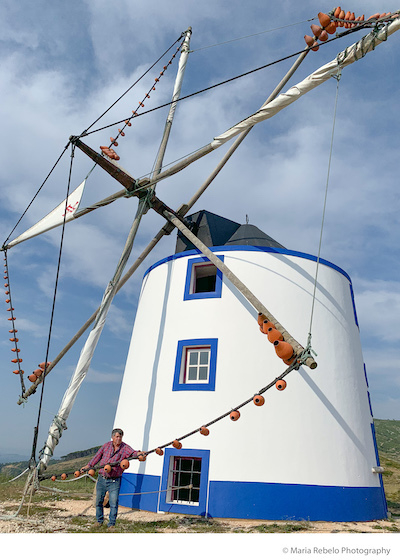in the key of C Major
Mar. 18th, 2024 11:38 amFor the daily prompt thing I'm doing, I ended up going down a rabbit hole about windmill sails and came across this story of a miller who restored the last of what used to be many windmills--"the highest concentration of windmills in the Iberian peninsula"--on a mountain in Portugal. Here he is with his windmill in 2019:

Photo by Maria Rebelo Photography; resized from the image at the blog post
He's using the mill to grind ancient wheat grains; he says ants prefer wheat grains that don't have pesticides.
Oh, and those clay pots hanging on the arms of the windmill? They are each tuned to a note in the key of C Major, and you can hear what they sound like in this soundcloud file.

Photo by Maria Rebelo Photography; resized from the image at the blog post
He's using the mill to grind ancient wheat grains; he says ants prefer wheat grains that don't have pesticides.
Oh, and those clay pots hanging on the arms of the windmill? They are each tuned to a note in the key of C Major, and you can hear what they sound like in this soundcloud file.
no subject
Date: 2024-03-18 04:47 pm (UTC)no subject
Date: 2024-03-18 06:29 pm (UTC)no subject
Date: 2024-03-18 05:04 pm (UTC)Since you mention mills, this is Meopham mill (it's pronounced mep-um) in my home county of Kent.
no subject
Date: 2024-03-18 06:28 pm (UTC)no subject
Date: 2024-03-18 05:40 pm (UTC)no subject
Date: 2024-03-18 06:26 pm (UTC)no subject
Date: 2024-03-18 06:00 pm (UTC)Wales tends to go in for watermills rather than windmills. We do have plenty of both wind and water, but down in the valleys where people would want to build the mills, water is more reliable.
no subject
Date: 2024-03-18 06:26 pm (UTC)no subject
Date: 2024-03-18 06:27 pm (UTC)no subject
Date: 2024-03-18 07:08 pm (UTC)no subject
Date: 2024-03-18 08:00 pm (UTC)no subject
Date: 2024-03-19 07:00 am (UTC)What I didn't realize I would find is that there are windmill remains all over the island-- not at all surprisingly, given that stones mostly let just to wait quietly until their next use.
Somewhat similarly, there are a few sites where the remains of prehistoric buildings called talaiots are specifically preserved-- the link leads to a document about the biggest and most-preserved/excavated one, which we visited. But then I realized that there are remains of talaiots or later very similar constructions all over the place, dotting farmers' fields....
no subject
Date: 2024-03-19 12:26 pm (UTC)Places where there are remnants of long, long continuous human presence are neat. The way different bits of history are present like different layers of paint or varnish on a place.
no subject
Date: 2024-03-19 12:39 pm (UTC)At the gate, selling the three euro entry, a small coffee bar staffed by one very elderly-looking woman. Just inside the fence, a mysterious shady enclosure housing a depressed-looking peacock. Around the talaiots, soil studded with small stones that has recently been sloughed, I think to limit weeds more than for any other purpose. From a seat on the top wall, I listened to tree sorrows, linnets, a serin. I had a glass of the one beer they sell, Estrella, before we left.
no subject
Date: 2024-03-20 10:01 am (UTC)no subject
Date: 2024-03-20 12:22 pm (UTC)no subject
Date: 2024-03-18 08:52 pm (UTC)no subject
Date: 2024-03-19 12:26 pm (UTC)no subject
Date: 2024-03-18 09:54 pm (UTC)Am I missing something here? Isn't that the point?
It's a very pretty mill, though!
no subject
Date: 2024-03-19 12:36 pm (UTC)With his son Luís, Miguel is bringing back the old wheats that are full of nutrition and flavor: barbela, nabão and preto amarelo. “These stones have never milled modern grains so they have no trace of pesticides. My wheats are certified as biological, not by the government but by nature, come see.” He places a handful of barbela grains at the entrance of the mill. Soon, an army of ants arrives to cart away this loot. “The ants avoid grains that have pesticides, but they love these ancient wheats,” Miguel says. “I am also starting to find more and more lady bugs on the wheat fields, they had vanished from this region but they are coming back to my fields.” Miguel likes to plant his wheat in southern-facing slopes protected from northern winds that are likely to be tainted with pesticides.
So really for the sake of my post it would have been better if I mentioned the ladybugs than the ants. Because who wants their crop to be carried off? Or to put it another way, if you're not using pesticides, what are you doing to keep your crop from being carried off?
no subject
Date: 2024-03-20 12:21 pm (UTC)no subject
Date: 2024-03-20 08:31 pm (UTC)no subject
Date: 2024-03-19 08:02 am (UTC)no subject
Date: 2024-03-19 12:37 pm (UTC)no subject
Date: 2024-03-19 02:05 pm (UTC)no subject
Date: 2024-03-20 09:59 am (UTC)no subject
Date: 2024-03-21 12:23 am (UTC)no subject
Date: 2024-03-21 04:57 am (UTC)no subject
Date: 2024-03-25 04:34 pm (UTC)no subject
Date: 2024-03-27 03:50 pm (UTC)